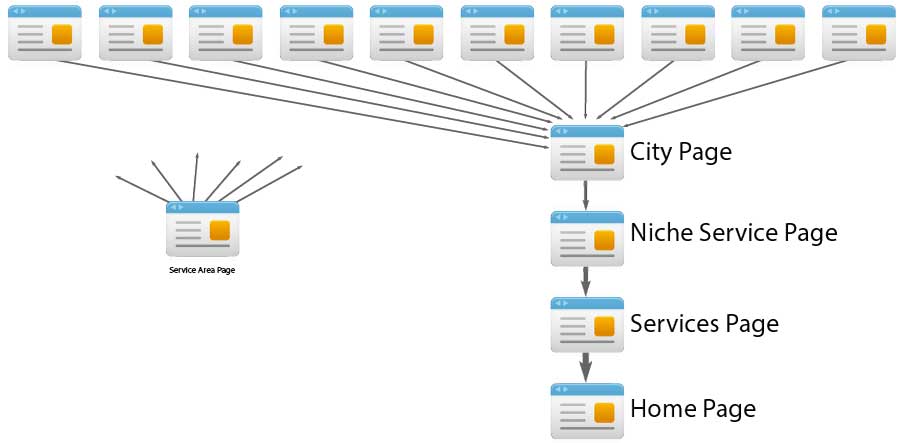Backlinking and internal linking structures are still a very important part of the way Google measures your website’s search result ranking with its Algorithm. People in the search engine optimisation business refer to the structure and direction of internal and external linking analogously in terms of liquid or the way a series of streams flow into a river, then an ocean. The way water travels from the hills to the ocean is similar to the way one or many links flow into others and grow stronger as they get closer to their target page. Consequently, those who do search engine optimising, being hip cats, use the slang term link juice (maybe it had the added hype of steroids or OJ Simpson too, who knows?).
Furthermore, Link juice, link authority, backlink authority all refer to the same similar thing. In practice Googles measures how links connect from one page or piece of content to another. Google then uses some secret key metrics to determine how this will fit into your page or sites overall profile and ultimately affect the way your site ranks when someone searches using keywords.
The basic principle is, when page one links to page two some of the rank position or authority is transferred to page two. Furthermore, if all things are equal if page one ranks much higher than page two significant juice or ranking increases will be seen. However, this doesn’t mean all far-reaching external/internal links need to be higher than their downstream connections to be effective. What seems to be more important is they are relevant to the topic they are linking to. I won’t go into it too much further here as it gets real complicated quickly. I’ll save that for another blog 😉
Note: A very negative spammy link or links going in the wrong direction will take away from your target pages link juice. This is a very common mistake for beginners.
How to improve link juice?
There are lots of different ways to improve link juice. However, it should always start with the target pages first. You need to make sure they will fully answer each users search enquiry. They should also be content rich, with lots of original text, images, infographics and video. Additionally, ensure you have some type of user analytics in place. You need to know where your traffic is coming from and are those new backlinks relevant to your content. As things go, getting a bunch of extra new traffic that all bounces is worse than having very little traffic. If this happens Google will assume you are not what people want when searching for your keywords and start dropping your pages ranks accordingly. Therefore you need to create links back to your target pages using anchor text links that are relevant and from topic matching or complimentary niches. (I won’t be going into advanced techniques, such as; Tier 1, 2, 3 and PBNs I’ll save it for another blog and keep this at the beginner level.)
You can create link juice by; posting content on other sites as a guest or featured blogger, from social media, press releases, reviews, blogger outreach, case studies, local directories, industry websites, PBNs, Google Stacks, Comments (not spamming ones!!), broken link building.
Ideally, you want to link from sites with a higher domain authority that is relevant to your niche. That way you will get more SEO link juice out of it for your effort.
To help with the process of finding good websites and pages to link from tools, such as; Ahrefs, SEOProfiler, Majestic and SEMRush are very helpful. However, you can just use Googles search and a bit of guess work to do the same job, which is fine for most local business applications.
I hope this helps explain the basics behind link juice and if you have any question leave a comment or make contact via email or social media
Bibliography:
Fishkin, R. (2012, April 11). Determining Whether a Page/Site Passes Link Juice (and How Much). Retrieved July 11, 2017, from https://moz.com/blog/determining-whether-a-page-site-passes-link-juice
What is Link Juice? The Crazy Egg Glossary. (n.d.). Retrieved July 11, 2017, from https://www.crazyegg.com/blog/glossary/link-juice/



